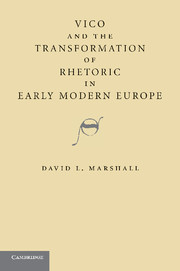1 - Introduction
Published online by Cambridge University Press: 06 July 2010
Summary
Few thinkers of comparable stature have resisted integration into European intellectual history to the same degree as Giambattista Vico. Vico—professor of rhetoric in eighteenth-century Naples—is customarily regarded as the most original thinker in the Italian philosophical tradition. Yet there is no consensus on where to categorize him. No one is satisfied with the conclusion that Vico was intellectually isolated and should simply be considered sui generis. But, by the same token, a good deal of excellent scholarship has failed to uncover a set of rich and robust interchanges between Vico and his contemporaries that could anchor him in a particular sequence of intellectual inquiry. Traditionally, scholars have characterized Vico as another father of history, a modern Herodotus anticipating the historicists of the nineteenth century who imagined that history as a whole had some kind of cognizable form. In this reading, Vico prefigures thinkers in the German historicist tradition—Herder, Hegel, Marx—and depending on who is doing the narrating, this is thought to be either heroic or tragic. Either way, Vico is taken to be a thinker who licenses the ideologically motivated interventions in history that distinguish the modern age. But in recent decades, scholars have shown that in order to reduce Vico to a philosopher of history, one has to ignore a whole host of intellectual interests that are basic to Vico's oeuvre and to his masterpiece, the Princìpi di scienza nuova d'intorno alla comune natura delle nazioni.
- Type
- Chapter
- Information
- Publisher: Cambridge University PressPrint publication year: 2010



